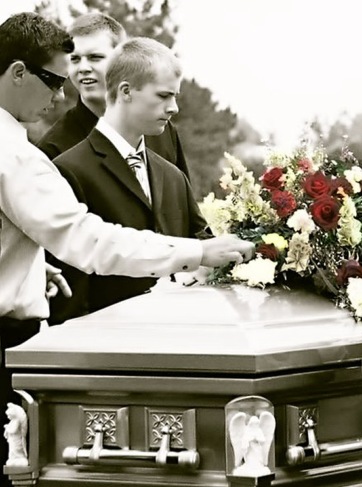 With so many people (some of whom are very dear to my heart) losing family members recently, I feel compelled to offer some support, and comfort. I wanted to go well beyond a post on my friends’ Facebook walls, or dropping by the funeral parlor to express my condolences. What I’m about to say will reach many, and hopefully leave the reader with a little hope that YOU ARE NOT ALONE! I’m not going to attempt to paint a rosy picture of how when those we love die, they dance among the clouds, or that rainfall means that they are up in Heaven watering their flowers. Although we have to do what is necessary to cope with the sudden loss, the reality is that after we wake up from the daydreams we’ve created, life here on earth is still going on. It continues after the “setting up” or the wake is over. After the ceremony and the repast is done, we return to our homes. Family members go back to their respective parts of the world, and for the first time in a week or more, we are left to face our deepest thoughts and pain…alone. Each day thereafter, we can either choose to acknowledge our fears and bewilderment about how such a thing could happen, or pretend that nothing ever happened at all.
With so many people (some of whom are very dear to my heart) losing family members recently, I feel compelled to offer some support, and comfort. I wanted to go well beyond a post on my friends’ Facebook walls, or dropping by the funeral parlor to express my condolences. What I’m about to say will reach many, and hopefully leave the reader with a little hope that YOU ARE NOT ALONE! I’m not going to attempt to paint a rosy picture of how when those we love die, they dance among the clouds, or that rainfall means that they are up in Heaven watering their flowers. Although we have to do what is necessary to cope with the sudden loss, the reality is that after we wake up from the daydreams we’ve created, life here on earth is still going on. It continues after the “setting up” or the wake is over. After the ceremony and the repast is done, we return to our homes. Family members go back to their respective parts of the world, and for the first time in a week or more, we are left to face our deepest thoughts and pain…alone. Each day thereafter, we can either choose to acknowledge our fears and bewilderment about how such a thing could happen, or pretend that nothing ever happened at all.
It’s been my experience that death of a loved-one is the single most painful occurrence that can happen to a person in their lifetime. The sorrow associated with grief is unparalleled by any other loss. I remember attending my first funeral at 8 years old. It was the first time I ever saw a casket. I remember it so vividly: the spray on top, the shiny metallic blue color, and the smell of the works of the embalmers. For weeks afterwards, when I closed my eyes at night, I had visions of that image. Let’s just say, I finally convinced my mom to buy a night light…for the times when I wasn’t scared to death and sleeping in her bed. It was not a gruesome sight. It was a vision that was plain and clear, yet something that I didn’t understand. But that particular death wasn’t a cause for grief for me. I didn’t even know the lady.
The next year, my Aunt’s husband passed away unexpectedly after an injury at work. It was then that I saw grief up close and personal. A child, I thought it was sad that I would never see my uncle (by marriage) again, but when I saw the people I loved (his wife and children) crying their eyes out, unable to gather themselves, it hit me! I knew that I never, ever wanted to feel that way! I knew that death was a very bad thing and that it was the one thing that I was afraid of. I stood back at the wake and I watched. I listened. Then too, I saw visions of his open casket at night.
Then, it was my turn. At age ten sitting on that front pew, pretending to be ambivalent about my very own mother at rest in a shiny blue casket, topped with an elaborate casket spray. The conflict brewing inside me wasn’t the reality, rather it was the mystery. Again, this “death” thing was something I just didn’t understand. I asked myself these questions for years:
- Why did this happen?
- How could God take someone like that?
- Why, me? Why my mother (insert relation here)?
- How can I be sure they’re really in Heaven?
- What did I do to cause this?
I noticed that the more people I saw leave this earth, the more these questions prevailed! The reality is, it’s all about what one believes. In the face of death is where your faith comes into play. Let’s take a look at this from three angles. First, some believe that God is in control and that their loved one is in a better place, which helps ease the pain. Second, others believe that death is purely random and that God gives us free will, therefore he does not arbitrarily “take” people to end their suffering. In other words…it was “just their time.” Third, there are those who do not believe in a supreme being or an afterlife at all. Regardless, the realization that your parent, child, friend, or significant other will no longer be here with you produces the same result: GRIEF.
Elisabeth Kübler-Ross & David Kessler have a wonderful website on grief and grieving. They developed a model.
The Five Stages of Grief:
- Denial: Initial shock, or the inability to believe the person is really gone.
- Anger: feelings you have towards who or what may be responsible for the loss; even God.
- Bargaining: wanting to go back in time to free yourself of any guilt you may have regarding your loved one.
- Depression: The sadness we feel when we realize that the occurrence is real and that there is nothing we can do to bring them back.
- Acceptance: Feeling that it is fine that the person has gone on, and learning to cope in your life without them.
Read the complete model here!
Another point I’d like to make to grieving adults is that the children around you who are witnessing your grief are watching you to determine how they should respond to their own feelings. For children, death is scary. Often, when children actually see adults grieving, it’s the first time they’ve seen vulnerability in their care-givers. Please, if a child is not crying (or doing anything during a time of bereavement that is even remotely similar to what the grown-ups are doing), don’t ever assume that he or she is “fine,” or not in any pain. Talk to children and be honest about what is happening and let them know that their feelings are valid. Understand that they may not want to talk about the loss right away. It may take weeks or months before they are ready to verbally express the pain they feel. To use myself as an example, I was nearly 20 years old before I truly understood the void that my mother’s death had left in my life. I was probably stuck in the DENIAL stage of grief for more than ten years!
If you are trying to comfort someone who has experienced a loss, be mindful that the things you say during this period can have a healing effect, or an adverse affect on the survivor. Whether you have heard the things below before, or if you’ve said them to someone else, do understand that sometimes, just offering to be there when needed is plenty!
In addition to the five stages of grief, Kübler-Ross & Kessler created a list of the best and worst things to say to someone who is grieving:
The Worst Things to Say to Someone in Grief
- At least she lived a long life, many people die young
- He is in a better place
- She brought this on herself
- There is a reason for everything
- Aren’t you over him yet, he has been dead for a while now
- You can have another child still
- She was such a good person God wanted her to be with him
- I know how you feel
- She did what she came here to do and it was her time to go
- Be strong
The Best Things to Say to Someone in Grief
- I am so sorry for your loss.
- I wish I had the right words, just know I care.
- I don’t know how you feel, but I am here to help in any way I can.
- You and your loved one will be in my thoughts and prayers.
- My favorite memory of your loved one is…
- I am always just a phone call away
- Give a hug instead of saying something
- We all need help at times like this, I am here for you
- I am usually up early or late, if you need anything
- Saying nothing, just be with the person
Ultimately, we all have to leave this earth at some point. However, it is wise for us to depend on each other to make it through the grieving process. Some would say that we only life to bury one another. This is why it’s imperative that we live each day like it’s our last, and do the best we can to love those who are dear to us while we are here together.


Joan, I felt some peace of mind after reading this. Words cant express the appreciation I have for you, my friend. Learning from others’ deep, dark, emotional feelings are the only insight that one may have into what to expect emotionally when death occurs, because death comes like a thief in the night, with no knock at the door, just a phone call with news of a tragedy, a tragedy that you have no control over whatsoever. My heart is full of happy memories that are right now drowning in sorrow over the lost of my brother. Benjamin Silas Hunter Jr. Thank you for the up lifting words and encouragement.
Benzina
LikeLike
ポロシャツ 通販 激安
LikeLike
The next person that tells me I must get over the death of my child will be punched!
LikeLike
Oh my! Who on earth is telling you that? You will never get over it, but you can learn to live with it. That is the thing we must do. You need a support system of people who understand and who won’t put you on a timeline.
LikeLike
I like reading through an article that will make people think.
Also, many thanks for permitting me to comment!
LikeLike